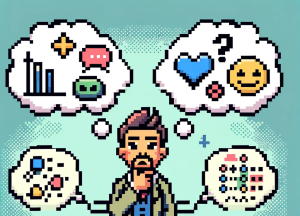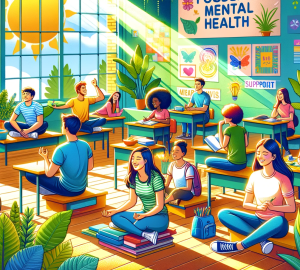
The Unexpected Classroom Experiment That Changed Everything
A middle school teacher decided to try a simple experiment: She asked her students to go 24 hours without social media and write about their experience. The results were staggering. Some students described feeling relief—finally free from the constant pressure to check their phones. Others admitted they didn’t know what to do with themselves. But the most heartbreaking response? “I didn’t realize how unhappy social media makes me until I tried to stop.”
If you’re a parent or educator, you’ve probably seen the effects of social media on kids firsthand—endless scrolling, anxiety over likes and comments, and difficulty focusing in class. But while much attention is given to the dangers of social media addiction, few talk about the hidden superpowers that protect kids from falling into its trap.
New research reveals two powerful protective factors that help shield children from social media addiction: optimism and personal growth initiative. And the best part? These are skills we can actively nurture in kids at home and in school.
What the Science Says: Why Some Kids Are More Resilient
A study of over 500 college students used the Bergen Social Media Addiction Scale to classify users into three categories: low-risk, moderate-risk, and high-risk social media users. The results? About 1 in 10 students were at high risk for social media addiction, and female students were more likely to be in this category.
But here’s where it gets interesting: Students who had higher levels of optimism and personal growth initiative were far less likely to be classified as social media addicts.
Optimism: The Brain’s Natural Armor
Optimism isn’t just about thinking positively—it’s a mindset that helps kids see challenges as temporary and solvable. Optimistic children tend to experience less stress, higher resilience, and stronger relationships. Researchers found that optimism significantly reduced the likelihood of social media addiction because these kids were less likely to use social media as a coping mechanism for stress or anxiety.
Personal Growth Initiative: The Drive to Improve
This is the ability to set goals, seek self-improvement, and take proactive steps toward personal development. Kids with strong personal growth initiative tend to be more self-aware and intentional about their actions, making them less susceptible to passive, compulsive social media use. Essentially, they’re more likely to use social media as a tool rather than let it control them.
Turning Science into Action: What Parents and Educators Can Do
The takeaway is clear: If we want to help kids navigate the digital world in a healthy way, we need to focus on building optimism and fostering a sense of personal growth. Here’s how you can do that starting today:
1. Help Kids Reframe Setbacks
Optimism can be taught. When a child faces a challenge, help them reframe the situation with a growth mindset. Instead of “I’m bad at math,” encourage “I’m still learning this concept.” These small shifts in thinking can reduce stress and the need to escape into social media.
2. Encourage Goal-Setting (Big or Small!)
Kids who develop personal growth initiative are more engaged in their own development. Encourage them to set daily goals—whether it’s reading a chapter in a book, learning a new skill, or improving at a hobby. Schools can integrate this into the classroom by celebrating progress rather than just achievement.
3. Limit Passive Social Media Use
Not all screen time is bad, but passive scrolling can be harmful. Encourage kids to use social media actively—creating, sharing, learning—rather than mindlessly consuming content. Parents can set “creative screen time” hours where kids can only use apps for creative activities like writing, video editing, or learning new skills.
4. Model Healthy Digital Habits
Let’s be honest—kids learn more from what we do than what we say. If we’re constantly glued to our own devices, they’ll follow suit. Show them that life exists beyond the screen by engaging in offline activities together.
Why This Matters: Schools’ Role in Mental Health
Social media addiction isn’t just a personal issue—it’s a school issue. Students struggling with social media addiction often have: ✔ Lower attention spans in class ✔ Increased anxiety and depression ✔ Disrupted sleep patterns, leading to academic struggles
Schools should actively teach digital literacy and emphasize social-emotional learning. Just as we educate kids about healthy eating and exercise, we need to educate them about healthy digital habits. Districts can invest in resilience-based curricula that teach optimism, self-regulation, and goal-setting.
Let’s Talk About It: Join the Conversation
This research gives us hope. Social media addiction isn’t inevitable, and we have powerful tools to help kids build resilience against it.
💬 What’s the biggest mental health challenge you see in schools today? 💬 How can schools better support students’ emotional well-being? 💬 What’s one digital habit you’ve changed in your own life that you wish kids would adopt?
Let’s start the conversation. Share your thoughts in the comments or pass this along to a fellow parent or educator who needs to read this today!
Join the Educational Revolution!
Begin your adventure with This Week in School Psychology for only $5 a month or $50 annually. Be at the forefront of educational breakthroughs and mental health insights. Subscribe to become a beacon of knowledge in your community, simplifying the complex world of educational research. Why wait? Ignite your passion for learning today and enjoy exclusive savings with our annual plan!



